初中英语时态专项讲解及练习(进行时及完成时)练习
初中必备英语动词的时态技巧全解及练习题(含答案)
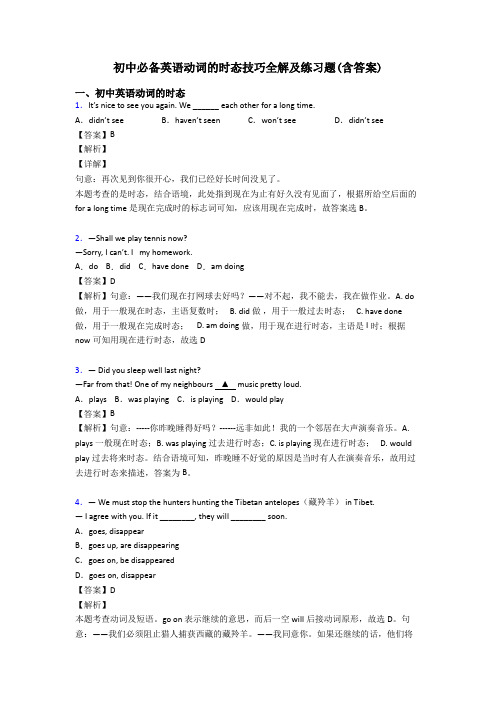
初中必备英语动词的时态技巧全解及练习题(含答案)一、初中英语动词的时态1.It’s nice to see you again. We ______ each other for a long time.A.didn’t see B.haven’t seen C.won’t see D.didn’t see【答案】B【解析】【详解】句意:再次见到你很开心,我们已经好长时间没见了。
本题考查的是时态,结合语境,此处指到现在为止有好久没有见面了,根据所给空后面的for a long time是现在完成时的标志词可知,应该用现在完成时,故答案选B。
2.—Shall we play tennis now?—Sorry, I can’t. I my homework.A.do B.did C.have done D.am doing【答案】D【解析】句意:——我们现在打网球去好吗?——对不起,我不能去,我在做作业。
A. do 做,用于一般现在时态,主语复数时; B. did做,用于一般过去时态; C. have done 做,用于一般现在完成时态; D. am doing做,用于现在进行时态,主语是I时;根据now可知用现在进行时态,故选D3.— Did you sleep well last night?—Far from that! One of my neighbours ▲ music pretty loud.A.plays B.was playing C.is playing D.would play【答案】B【解析】句意:-----你昨晚睡得好吗?------远非如此!我的一个邻居在大声演奏音乐。
A. plays一般现在时态;B. was playing 过去进行时态;C. is playing 现在进行时态; D. would play过去将来时态。
结合语境可知,昨晚睡不好觉的原因是当时有人在演奏音乐,故用过去进行时态来描述,答案为B。
现在完成时与现在完成进行时态讲解及练习(含答案)
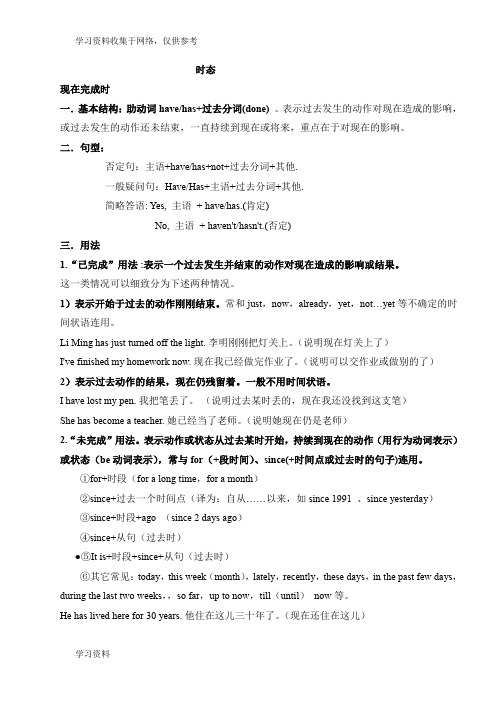
时态现在完成时一.基本结构:助动词have/has+过去分词(done) 。
表示过去发生的动作对现在造成的影响,或过去发生的动作还未结束,一直持续到现在或将来,重点在于对现在的影响。
二.句型:否定句:主语+have/has+not+过去分词+其他.一般疑问句:Have/Has+主语+过去分词+其他.简略答语: Yes, 主语+ have/has.(肯定)No, 主语+ haven't/hasn't.(否定)三.用法1.“已完成”用法 :表示一个过去发生并结束的动作对现在造成的影响或结果。
这一类情况可以细致分为下述两种情况。
1)表示开始于过去的动作刚刚结束。
常和just,now,already,yet,not…yet等不确定的时间状语连用。
Li Ming has just turned off the light. 李明刚刚把灯关上。
(说明现在灯关上了)I've finished my homework now. 现在我已经做完作业了。
(说明可以交作业或做别的了)2)表示过去动作的结果,现在仍残留着。
一般不用时间状语。
I have lost my pen. 我把笔丢了。
(说明过去某时丢的,现在我还没找到这支笔)She has become a teacher. 她已经当了老师。
(说明她现在仍是老师)2.“未完成”用法。
表示动作或状态从过去某时开始,持续到现在的动作(用行为动词表示)或状态(be动词表示),常与for(+段时间)、since(+时间点或过去时的句子)连用。
①for+时段(for a long time,for a month)②since+过去一个时间点(译为:自从……以来,如since 1991 、since yesterday)③since+时段+ago (since 2 days ago)④since+从句(过去时)●⑤It is+时段+since+从句(过去时)⑥其它常见:today,this week(month),lately,recently,these days,in the past few days,during the last two weeks,,so far,up to now,till(until)now等。
现在完成时及现在完成进行时讲解及练习

现在完成进行时1 定义:现在完成进行时表示动作从过去某一时间开始,一直延续到现在,可能还要继续下去。
2 现在完成进行时的构成:现在完成进行时是由“have/has+been+动词的现在分词”构成3 现在完成进行时的基本句型肯定式I/We have been working.疑问式Have you been working?简略回答Yes,I/we have. No,I/we haven't.肯定式He/She/It has been working.疑问式Has he/she/it been working?简略回答Yes,he/she/it has. No,he/she/it hasn't.4 现在完成时的用法1)在强调指出动作还未结束,还要继续下去。
如:I've been reading this book for two hours,but I haven't finished it. 这本书我已读了两个小时了,但我还没读完。
I've read this book.我已读完这本书了。
2)强调动作延续时间的长久或带感情色彩。
She has always been working like that.她一贯是这样工作的。
3)现在完成进行时也可表示现在以前这段时间反复发生的事情。
We've been seeing quite a lot of each other recently.最近我们经常见面。
5 相同点1. 现在完成时和现在完成进行时都可以表示从过去某一时刻开始一直延续到现在的动作.如: I have worked in this school since 2001. I have been working here since 2001.2. 现在完成时和现在完成进行时都可以表示一段时间内进行的动作.例如: Mr. Smith has taught English for 20 years. Mr. Smith has been teaching English for 20 years 6 现在完成时和现在完成进行时的区别1)现在完成进行时更强调动作的延续性,它是现在完成时的强调形式。
现在完成时及现在完成进行时讲解及练习

一.现在完成时的构成:现在完成时由助动词have(has)+动词的过去分词构成。
has用于第三人称单数,have用于其他各种人称.二. 现在完成时的用法: 其用法主要有三种I. “已完成”用法:表示一个过去发生并结束的动作对现在造成的影响或结果。
这一类情况可以细致分为下述两种情况。
1)表示开始于过去的动作刚刚结束。
常和just, now, already, yet, not…yet等不确定的时间状语连用。
Li Ming has just turned off the light. 李明刚刚把灯关上。
(说明现在灯关上了)I've finished my homework now. 现在我已经做完作业了。
(说明可以交作业或做别的了)2)表示过去动作的结果,现在仍残留着。
一般不用时间状语。
I have lost my pen .我把笔丢了。
(说明过去某时丢的, 现在我还没找到这支笔)She has become a teache她已经当了老师。
(说明她现在仍是老师)II. “未完成”用法。
表示动作或状态从过去某时开始,持续到现在,可能继续下去,也可能刚刚结束。
常和表示一段时间的状语连用。
如today, this week(month), lately, recently, these days, in the past few days, during the last two weeks, since, since yesterday, since 2 days ago, since 1991, for a long time, for a month, so far, up to now, till (until )now 等。
He has lived here for 30 years他住在这儿三十年了。
(现在还住在这儿)They've known each other si nee childhood他们从小彼此相识。
初一五种基本时态讲解及练习

初一英语语法(时态)总结几种简单时态:(1)一般现在时:表示现阶段经常或习惯发生动作或存在的状态,或说明主语特征。
①一般现在时句子中常有的时间状语:often,usually,sometimes,always,every (day等),once/twice,a (week等), on (Sunday等),never,in the (morning等)。
如:They go to the Palace Museum once a year.(他们每年去一次故宫)/They often discuss business in the evening.(他们经常在晚上商谈生意)②表示客观真理、事实、人的技能或现在状态时句子里一般不用时间状语。
如:Our teacher said that the earth turns round the sun.(地球绕着太阳转)/Light travels faster than sound.(光传播比声音快)③表示十分确定会发生(如安排好的事情)或按照时间表进行的事情,用一般现在可以表达将来,句子中可以有将来时间。
如:The train for Haikou leaves at 8:00 in the morning.(开往海口的列车上午8点开车)④在时间状语从句中(以when, after, before, while, until, as soon as等引导)和条件状语从句中(以if,unless引导),用一般现在时代替一般将来时,句子可以有将来时间。
如:Please ring me up as soon as you arrive in Germany.(你一到德国就给我打电话)If it rains tomorrow,we will have to stay at home.(如果明天下雨我们只好呆在家)⑤一般现在时用于倒装句中可以表示正在发生的动作,动词以come, go为主。
初中英语时态讲解及练习(全)

时间状语:Tomorrow, next day(week, month, year…),soon, in a few minutes, by…,the day after tomorrow, etc.
否定形式:主语+am/is/are not going to do ; 主语+will/shall not do+其他 一般疑问句:be放于句首;will/shall提到句首。
1.I ____(write, am writing, is writing, are writing) a letter now. 2.Look, it _____(begin, is beginning, am beginning, are beginning) to rain. 3.They ____(study, is studying, am studying, are studying) medicine at the Medical Institute of Chengde these days. 4.He _____(teach, am teaching, is teaching, are teaching) an English lesson at this time.
谓语动词使用过去式形式, 加ed,分为规则和不规则变 化。表示过去经常发生的动 作,也可用“used to do ” 和“would +动词原形”。
1. He____(be, was, were, been) here a moment ago. 2. They ____(be, was, were, been) here just now. 3. The scientists _____(leave, leaves, leaved, left) for America yesterday. 4. Last week we ______(visit, visited ) the Science Museum. 5. When I was a child, I often ____(play, played) football. 6. The students ran out of the classroom as soon as the bell ____(ring, rang, rung).
初中必备英语动词的时态技巧全解及练习题(含答案)含解析
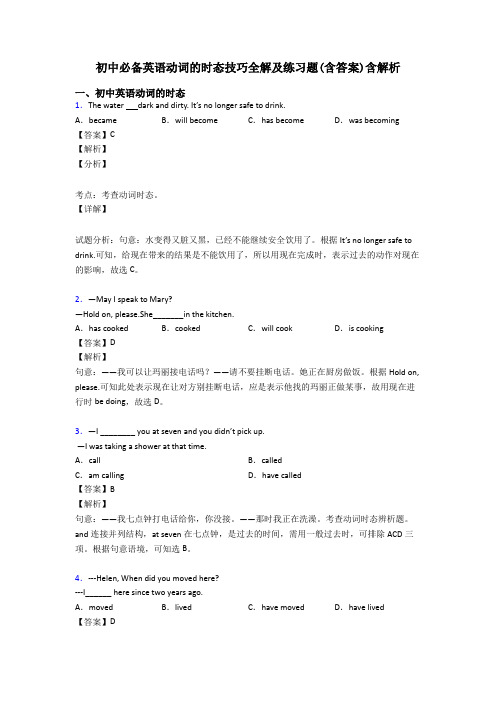
初中必备英语动词的时态技巧全解及练习题(含答案)含解析一、初中英语动词的时态1.The water dark and dirty. It’s no longer safe to drink.A.became B.will become C.has become D.was becoming【答案】C【解析】【分析】考点:考查动词时态。
【详解】试题分析:句意:水变得又脏又黑,已经不能继续安全饮用了。
根据It’s no longer safe to drink.可知,给现在带来的结果是不能饮用了,所以用现在完成时,表示过去的动作对现在的影响,故选C。
2.—May I speak to Mary?—Hold on, please.She_______in the kitchen.A.has cooked B.cooked C.will cook D.is cooking【答案】D【解析】句意:——我可以让玛丽接电话吗?——请不要挂断电话。
她正在厨房做饭。
根据Hold on, please.可知此处表示现在让对方别挂断电话,应是表示他找的玛丽正做某事,故用现在进行时be doing,故选D。
3.—I ________ you at seven and you didn’t pick up.—I was taking a shower at that time.A.call B.calledC.am calling D.have called【答案】B【解析】句意:——我七点钟打电话给你,你没接。
——那时我正在洗澡。
考查动词时态辨析题。
and连接并列结构,at seven在七点钟,是过去的时间,需用一般过去时,可排除ACD三项。
根据句意语境,可知选B。
4.---Helen, When did you moved here?---I______ here since two years ago.A.moved B.lived C.have moved D.have lived【答案】D试题分析:句意:―海伦,你什么时候搬到这儿的?―从两年前我就住在这儿。
初中英语语法八大时态总结及练习题
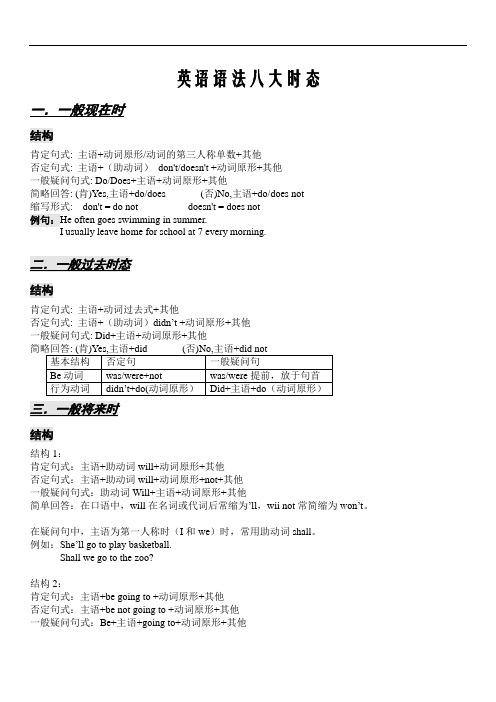
英语语法八大时态一.一般现在时结构肯定句式: 主语+动词原形/动词的第三人称单数+其他否定句式: 主语+(助动词)don't/doesn't +动词原形+其他一般疑问句式: Do/Does+主语+动词原形+其他简略回答: (肯)Yes,主语+do/does (否)No,主语+do/does not缩写形式: don't = do not doesn't = does not例句:He often goes swimming in summer.I usually leave home for school at 7 every morning.二.一般过去时态结构肯定句式: 主语+动词过去式+其他否定句式: 主语+(助动词)didn’t +动词原形+其他一般疑问句式: Did+主语+动词原形+其他基本结构否定句一般疑问句Be动词was/were+not was/were提前,放于句首行为动词didn’t+do(动词原形)Did+主语+do(动词原形)三.一般将来时结构结构1:肯定句式:主语+助动词will+动词原形+其他否定句式:主语+助动词will+动词原形+not+其他一般疑问句式:助动词Will+主语+动词原形+其他简单回答:在口语中,will在名词或代词后常缩为’ll,wii not常简缩为won’t。
在疑问句中,主语为第一人称时(I和we)时,常用助动词shall。
例如:She’ll go to play basketball.Shall we go to the zoo?结构2:肯定句式:主语+be going to +动词原形+其他否定句式:主语+be not going to +动词原形+其他一般疑问句式:Be+主语+going to+动词原形+其他简略回答:(肯)Yes,主语+be (否)No,主语+be not将来时其他表示法1)be going to表示将来表示说话人的打算、计划、安排或根据迹象判断必然或很可能发生的事情。
初中英语语法专项复习英语动词时态和语态讲解和练习题
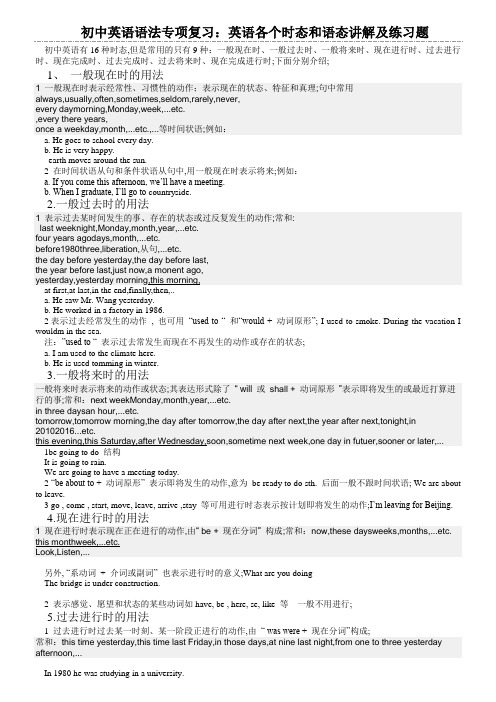
初中英语语法专项复习:英语各个时态和语态讲解及练习题初中英语有16种时态,但是常用的只有9种:一般现在时、一般过去时、一般将来时、现在进行时、过去进行时、现在完成时、过去完成时、过去将来时、现在完成进行时;下面分别介绍;1、一般现在时的用法1 一般现在时表示经常性、习惯性的动作;表示现在的状态、特征和真理;句中常用always,usually,often,sometimes,seldom,rarely,never,every daymorning,Monday,week,...etc.,every there years,once a weekday,month,...etc.,...等时间状语;例如:a. He goes to school every day.b. He is very happy.earth moves around the sun.2 在时间状语从句和条件状语从句中,用一般现在时表示将来;例如:a. If you come this afternoon, we’ll have a meeting.b. When I graduate, I’ll go to countryside.2.一般过去时的用法1 表示过去某时间发生的事、存在的状态或过反复发生的动作;常和:last weeknight,Monday,month,year,...etc.four years agodays,month,...etc.before1980three,liberation,从句,...etc.the day before yesterday,the day before last,the year before last,just now,a monent ago,yesterday,yesterday morning,this morning,at first,at last,in the end,finally,then,..a. He saw Mr. Wang yesterday.b. He worked in a factory in 1986.2表示过去经常发生的动作, 也可用“used to “ 和“would + 动词原形”; I used to smoke. During the vacation I wouldm in the sea.注:”used to “ 表示过去常发生而现在不再发生的动作或存在的状态;a. I am used to the climate here.b. He is used tomming in winter.3.一般将来时的用法一般将来时表示将来的动作或状态;其表达形式除了“ will 或shall + 动词原形”表示即将发生的或最近打算进行的事;常和:next weekMonday,month,year,...etc.in three daysan hour,...etc.tomorrow,tomorrow morning,the day after tomorrow,the day after next,the year after next,tonight,in 20102016...etc.this evening,this Saturday,after Wednesday,soon,sometime next week,one day in futuer,sooner or later,...1be going to do 结构It is going to rain.We are going to have a meeting today.2 “be about to + 动词原形” 表示即将发生的动作,意为be ready to do sth. 后面一般不跟时间状语; We are about to leave.3 go , come , start, move, leave, arrive ,stay 等可用进行时态表示按计划即将发生的动作;I’m leaving for Beijing.4.现在进行时的用法1 现在进行时表示现在正在进行的动作,由“ be + 现在分词” 构成;常和:now,these daysweeks,months,...etc. this monthweek,...etc.Look,Listen,...另外, “系动词+ 介词或副词” 也表示进行时的意义;What are you doingThe bridge is under construction.2 表示感觉、愿望和状态的某些动词如have, be , here, se, like 等一般不用进行;5.过去进行时的用法1 过去进行时过去某一时刻、某一阶段正进行的动作,由“ was were + 现在分词”构成;常和:this time yesterday,this time last Friday,in those days,at nine last night,from one to three yesterday afternoon,...In 1980 he was studying in a university.He was reading a novel when I came in.6.现在完成时的用法现在完成时由“have/has + 过去分词.其使用有两种情况:1 现在完成时所表示的动作在说话之前已完成,但对现在有影响;句中没有具体时间状语;常和:just,alreadly,yet,never,ever,now,before,this week,today,these days,once,twice,three times,...He has gone to Fuzhou.He has been to Fuzhou.2 现在完成时所表示的动作开始于过去,持续到现在,也许还会持续下去常用for 和since表示一段时间的状语或since then1949,last Monday,two o'clock,从句...,etc.,ever since then,for three daysa long time,two hours,...etc.so far , now, today, this wek month, year 等表示包括现在内的状语;He has studied English for 5 years.He has studied English since 1985.Now I have finished the work..注意:表示短暂时间动作的词如come, go , die, marry, buy 等的完成时不能与for, since 等表示一般时间的词连用;正确:I have bought the book already.错误:I have bought the book for two years.改:I have had the bookl for two years.7.过去完成时的用法1 过去完成时由“had + 过去分词”构成;过去完成时的动作表示过去某一时刻或某一时刻或某一动作之前完成的动作或状态;句中常用by then1977,yesterday,eight last night,the time we got there,...etc.by the end of last termweek,year,month,...etc..by, before, until, when 等词引导的时间状语;By the end of last year we had built five new houses.I had learnt 5000 words before I entered the university.2过去完成时的动词还可表示过去某一时刻之前发生的动作或状态持续到过去某个时间或持续下去;Before he slept, he had worked for 12 hours.8.过去将来时的用法过去将来时表示从过去的某个时间看来将要发生的动作或存在的状态;过去将来时由“should 或would + 动词原形” 构成;第一人称用should, 其他人称用would. ;常和:They were sure that they would succeed.二动词语态1.当句子的主语是动作的执行者时, 谓语的形式叫主动语态;句子的主语是动作承受者时,谓语的形式叫被动作语态;被动语态由助动词be + 过去分词构成,时态通过be 表现出来;1 一般现在时:You are required to do this.2 一般过去时:The story was told by her.3 一般将来时:The problem will be discussed tomorrow.4 现在进行时:The road is being widened.5 过去进行时:The new tool was being made.6 现在完成时:The novel has been read.7 过去完成时:He said that the work had been finished.8 过去将来时:He said that the trees would be planted soon.2. 一些特殊的被动结构1 带情态动词的被动结构:The problem must be solved soon.2 带不定式的被动结构:The room is going to be painted.The homework needs to be done with care.3 短语动词的被动:a.不及物动词+介词:若这类短语动词是及物性的,则可用于被动语态中,如:laugh at, look after, talk about, think of 等;若这类短语动词是不及物性的则不可用于被动语态中,如:book up, look down. 等b.及物动词+副词:bring about, carry out, find out, make out, put away, put off, take up, turn down, turn out, wipe out 等c. 动词+副词+介词:do away with, face up to, give into ,look down upon, make up with等d. 动词+名词+介词:catch sight of, keep on eye on, make a fool of , pay attention to , put an end to , set fire/light to , take notice of 等4 带复合宾语的动词在改为被动语态时,一般把主动结构中的宾语改为主语,宾语补足语保留在谓语后面;We always keep the classroom clean.比较:The classroom is always kept clean.5主动形式表示被动意义的词;常见的有:a.主动形式,这时动名词同句中的主语有动宾关系;The children need looking after.The windows wants /requires repairing.This point deserves mentioning.练习题1. It is a fine day. The sun __________shine brightly.2. They ___________visit the Science Museum next Sunday.3. Mr Brown________live in Beijing since he came to China.4. Mr Wang ________teach us English two years ago.5. The Smiths _______________ watch TV at this time last night.6. We __________learn about ten English songs by the end of last term.7. Father said that he ____________buy a new bike for me the next Friday.8. Bill isn¡¯t here. He ___________chat with his friends in the classroom.9. The teacher said that the moon __________go round the earth.10. The Young Pioneers will go to the zoo if it ____________not rain this Sunday.11. Listen They __________talk about the new film.12. Jim asked us what ___________happen in China in 1976.13. My mobile phone ___________steal on a bus last week.14. The host ____________interview the little boy just now.15. The Greens __________watch TV now.16. He said that he _____________ring me up when he got there.17. We ____________learn English for about three years.18. My brother_____________join the League in 1997.19. The farmers __________pick apples when I saw them.20. The red skirt __________cost the girl forty yuan.21. The film ____________begin when I got to the cinema.22. The girl told me that she wanted to be an English teacher when she _____grow up.23. My sister is a student and she _____________study at a middle school nearby.24. Mr Green __________travel to several places in South China since he came here.25. You _________catch the early bus if you get up early.26. _______you been________wear glasses all the time27. I’ll go home as soon as I _______finish my homework.29. Most science books are ______write in English.30. I ____________stay there for two months last year.31. Tell Lily to call me as soon as she _______.A. will arriveB. gets thereC. has goneD. reach here32. ----Hi, Kate. You look tired. What’s the matter ----I ______ well last night.A. didn’t sleepB. don’t sleepC. haven’t sleptD. won’t sleep33. ----Excuse me, look at the sign over there, please. Could you stop smoking----Sorry, I ____ that.A. didn’t seeB. don’t seeC. won’t seeD. can’t see34. ----Well, I found this. I think it must be yours. ----My watch Thank you. Where _____itA. do you findB. had you foundC. were you findingD. did you find35. ----Don you know when Dr White ____ for dinner this evening----No, but I think he ____ when he is free.A. will come; comesB. will come; will comeC. comes; comesD. comes; will come36. Look at those black clouds. It _____ rain. Let’s hurry. A. maybe B. would C. has D. is going to37. ----Jimmy is leaving for a holiday. ----Really Where ____ he ____A. has; goneB. will; goC. did; goD. does; go38. ----Shall we go shopping now ---Sorry, I can't. I ____ my shirts.A. washB. washesC. washedD. am washing39. ----I called you yesterday evening, but there was no answer.----Oh, I am sorry. I ___ dinner at my friend's home.A. haveB. hadC. was havingD. have had40. The Oriental Pearl TV Tower ____ thousands of visitors since 1995.A. attractedB. attractsC. has attractedD. will attract46. ----Why didn't you go to the cinema yesterday -----Because I ____ the film before.A. had seenB. have seenC. have watchedD. has watched47. I don't think John saw me. He ____ a book at that moment.A. just readB. has just readC. was just readingD. had just read48. Mr Smith ____ a book about China last year but I don't know whether he has finished it.A. has writtenB. wroteC. had writtenD. was writing49. Mr White ____ the newspaper while his daughter ____TV.A. has read; was watchingB. was reading; watchedC. was reading; was watchingD. reading; watched50. ---- I ____ you at the meeting. Why ----I was ill. A. saw B. have seen C. not see D. didn't see51. The 29th Olympic Games ____ in Beijing in 2008. A. hold B. will hold C. will be held D. held52. Hurry up The play ____ for ten minutes. A. has been on B. has begun C. had begun D. began53. ----May I speak to Mr Smith ----Sorry, he ____ Australia. But he ____ in two days.A. has been to; will come backB. has gone to; will be backC. has been in; would come backD. is leaving for; doesn't come back54. I can't go to the theater tonight because I ____ my ticket.A. have lostB. had lostC. will loseD. was losing55. ----What a nice bike How long ____ you ____ it ----Just two weeks.A. have; boughtB. did; buyC. have; hadD. are; having56. ----I'm sorry to have kept you waiting. ----Oh, not at all. I ____ here only for a few minutes.A. have comeB. had beenC. wasD. have been57. ----____ my dictionary anywhere ---- Yes. I saw it on your desk a moment ago.A. Did you seeB. If you seeC. Had you seenD. Would you see58. We were all surprised when he mad it clear that he ____ office soon.A. leavesB. would leaveC. will leaveD. had left答案:I. 1. shines/ is shining 2. are going to/ will visit 3. has lived 4. taught5. were watching6. had learned7. would buy8. is chatting9. goes 10.doesn't rain 11. are talking 12. happened 13. was stolen 14. interviewed15. are watching16. would ring 17. have learned 18. joined 19. were picking 20. cost21. had begun 22. grew 23. studies 24. has traveled 25. will catch26. Have; wearing 27. finish 28. haven't heard 29. written 30. stayedII. 31--35 BAADB 36--40 DBDCC 41--45 ACBAC 46--50 ACDCD51--55 CABAC 56--60 DABDA 61--65 BDBAB 66-70 BDABC 71--75 BCADD。
中考英语专项5.时态讲解及习题

时态英语共有四时四体,其表现形式如下(以do为例)时态是表示行为、动作和状态在各种时间条件下的动词形式。
因此,当我们说时态结构的时候,指的是相应时态下的动词形式。
1. 一般现在时用法:A) 表示现在发生的动作、情况、状态和特征。
B) 习惯用语。
C) 经常性、习惯性动作。
例:He always helps others。
(他总是帮助别人。
)D)客观事实和普遍真理。
尤其要注意,如果前后文不是一般现在时,则无法保持主句、从句时态一致。
E) 表示一个按规定、计划或安排要发生的动作,(仅限于某些表示“来、去、动、停、开始、结束、继续”等的动词 )可以与表示未来时间的状语搭配使用.常见的用法是:飞机、火车、轮船、汽车等定期定点运行的交通方式。
例:The next train leaves at 3 o’clock this afternoon。
(下一趟火车今天下午3点开车。
)How often does this shuttle bus run? (这班车多久一趟?)F) 在时间和条件状语从句里经常用一般现在(有时也用现在完成时)表示将来事情。
例:When you have finished the report, I will have waited for about 3 hours。
(等你完成这份报告的时候,我就已经等了将近3个小时了。
)2。
现在进行时用法:现在正在进行的动作.3。
现在完成时用法:A) 表示动作到现在为止已经完成或刚刚完成。
例:I bought a new house, but I _________ my old one yet,so at the moment I have two houses。
A) didn’t sell B) sold C) haven't sold D)would sell答案是C)haven't sold。
B) 表示从过去某时刻开始,持续到现在的动作或情况,并且有可能会继续延续下去。
初中英语八大时态全套精讲及练习题(附答案)
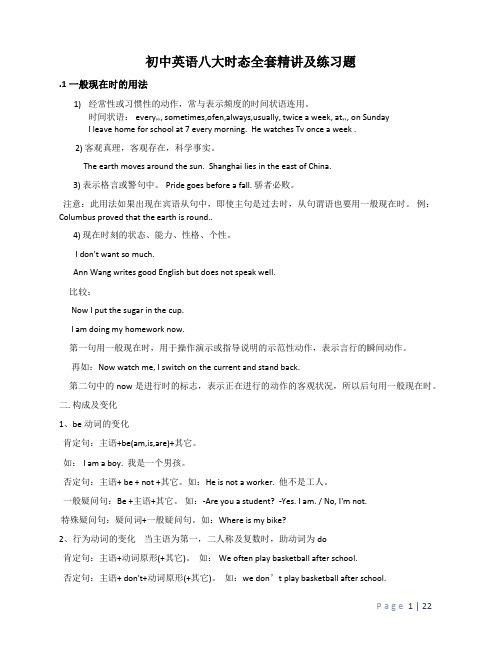
初中英语八大时态全套精讲及练习题.1 一般现在时的用法1)经常性或习惯性的动作,常与表示频度的时间状语连用。
时间状语: every…, sometimes,ofen,always,usually, twice a week, at…, on SundayI leave home for school at 7 every morning. He watches Tv once a week .2) 客观真理,客观存在,科学事实。
The earth moves around the sun. Shanghai lies in the east of China.3) 表示格言或警句中。
Pride goes before a fall. 骄者必败。
注意:此用法如果出现在宾语从句中,即使主句是过去时,从句谓语也要用一般现在时。
例:Columbus proved that the earth is round..4) 现在时刻的状态、能力、性格、个性。
I don't want so much.Ann Wang writes good English but does not speak well.比较:Now I put the sugar in the cup.I am doing my homework now.第一句用一般现在时,用于操作演示或指导说明的示范性动作,表示言行的瞬间动作。
再如:Now watch me, I switch on the current and stand back.第二句中的now是进行时的标志,表示正在进行的动作的客观状况,所以后句用一般现在时。
二. 构成及变化1、be动词的变化肯定句:主语+be(am,is,are)+其它。
如: I am a boy. 我是一个男孩。
否定句:主语+ be + not +其它。
如:He is not a worker. 他不是工人。
时态讲解及习题
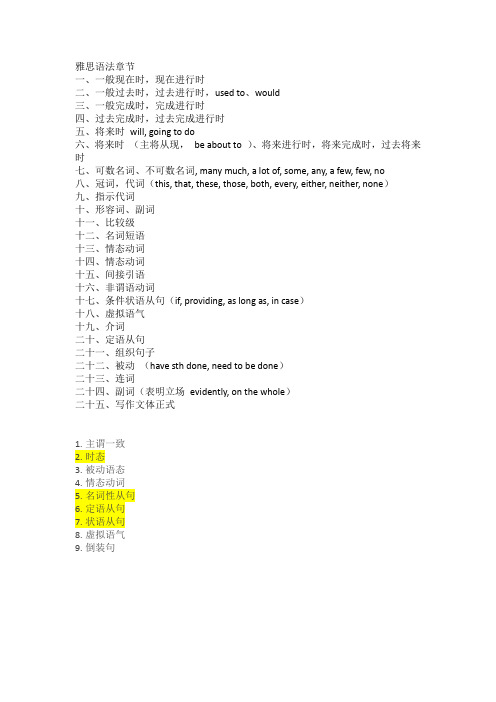
雅思语法章节一、一般现在时,现在进行时二、一般过去时,过去进行时,used to、would三、一般完成时,完成进行时四、过去完成时,过去完成进行时五、将来时will, going to do六、将来时(主将从现,be about to )、将来进行时,将来完成时,过去将来时七、可数名词、不可数名词, many much, a lot of, some, any, a few, few, no八、冠词,代词(this, that, these, those, both, every, either, neither, none)九、指示代词十、形容词、副词十一、比较级十二、名词短语十三、情态动词十四、情态动词十五、间接引语十六、非谓语动词十七、条件状语从句(if, providing, as long as, in case)十八、虚拟语气十九、介词二十、定语从句二十一、组织句子二十二、被动(have sth done, need to be done)二十三、连词二十四、副词(表明立场evidently, on the whole)二十五、写作文体正式1.主谓一致2.时态3.被动语态4.情态动词5.名词性从句6.定语从句7.状语从句8.虚拟语气9.倒装句一、时态一、一般现在时:She plays tennis. She does not play tennis. Do you play tennis1. 表示习惯(always, generally, normally, usually, often, sometimes, never, every day). I use the internet almost every day.2. 事实. The sun rises in the east.If you heat water to 100c, it boils.3. 祈使句Stand up! Go down the street and turn left.二、现在进行时he is living in Thailand. I’m not living in Thailand. Are they living inThailand表示正在进行的动作(at the moment, now, currently, this week.)I am studying hard for my exams.下列动词不用于现在进行时:Agree, believe, think, forget, hope, know…..Hate, like, want….Smell, hear, see, smell…the pudding tastes delicious.Have, own, belong….三、一般过去时she worked for the police. She did not work for the police.Did you work for the police(不规则动词表)rise, beat, build, break, pay有时间A few weeks ago a woman called to report a robbery at her house.可推测How did the burglar break in without knowing anybody hearing him•What did you do in your last holidays (口语)I went to Hainan last holiday and stayed there for about ten days. Although the weather was still cold here, it’s very warm in Hainan. I walked on the beach and appreciated the beautiful scenery过去式的特殊句型It is high/about time (that)……是该做什么的时候了,谓语动词用过去时。
上海中考时态讲解及练习

基本概念讲解(一)一般现在时含义:(1)表示现在经常发生的动作或存在的状态She is a teacher. She works in a middle school.(2)客观真理或普遍真理The earth moves around the sun.标志词:always, usually, often, sometimes, seldom, never, at weekends, on Sundays, every week/day/year (注意:有这些标志词并不一定就用一般现在时,还要结合具体语境)结构:(1)主语+am, is, are +其他。
(2) 主语+动词(三单/原形)+ 其他。
(二)现在进行时结构:主语+am/is/are +现在分词(ing)+其他。
含义:(1)现在此时此刻正在发生的动作。
标志词:now,look, listen, be quite, at the moment, these days, this weekBe quite. The baby is sleeping.Look! She is dancing.These days we are helping the farmers work on the farm.(2)可以表示一般将来时。
此时多与arrive, go, come, leave, get…等表示位移的动词连用We are leaving for Shanghai. 我们即将动身去上海。
He is coming in three days.(三)一般过去时含义:(1)过去某个时间里发生的动作或状态。
与last week/month/year, yesterday, two years ago, in the past, once, in 1990等连用。
(2)过去习惯性或经常性的动作,此时和always, often, usually 等连用结构:主语+动词过去式+其他。
初中英语语法:动词时态讲解及练习
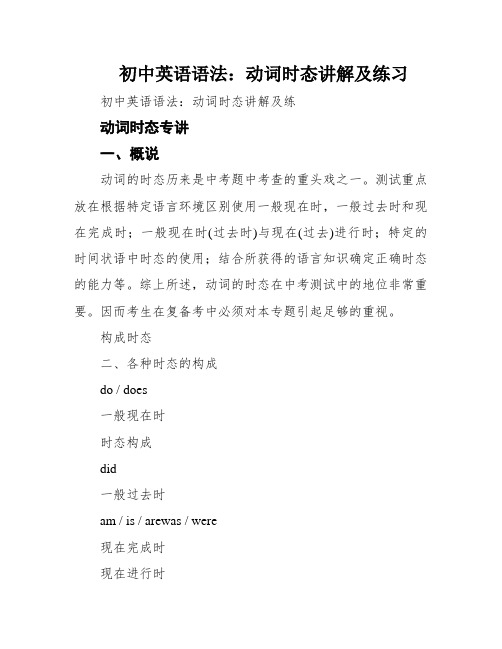
初中英语语法:动词时态讲解及练习初中英语语法:动词时态讲解及练动词时态专讲一、概说动词的时态历来是中考题中考查的重头戏之一。
测试重点放在根据特定语言环境区别使用一般现在时,一般过去时和现在完成时;一般现在时(过去时)与现在(过去)进行时;特定的时间状语中时态的使用;结合所获得的语言知识确定正确时态的能力等。
综上所述,动词的时态在中考测试中的地位非常重要。
因而考生在复备考中必须对本专题引起足够的重视。
构成时态二、各种时态的构成do / does一般现在时时态构成did一般过去时am / is / arewas / were现在完成时现在进行时一般将来时am / is / are + doinghave / has + doneshall / will + do曩昔完成时过去进行时过去将来时was / were + doingwould + dohad + donewas / were going + to doam / is / are going + to do普通目前时三、各种时态的用法1.透露表现经常性或气性的举措,常与透露表现频度的工夫状语连用。
时间状语:every day,every other day,sometimes,often,usually,on Sunday …I leave home for school at 7 _________________ (天天清晨).The Olympic Games are held ____________________ (每四年).What do you ____________ (平日) do when you are free on Sunday?2.用在客观真理,客观存在,科学事实或格言警句中。
The earth _________________ (绕着……转) the sun.Shanghai lies in the east of China.上海__________中国的东方。
时态讲解及习题

雅思语法章节一、一般现在时,现在进行时二、一般过去时,过去进行时,used to、would三、一般完成时,完成进行时四、过去完成时,过去完成进行时五、将来时 will, going to do六、将来时(主将从现, be about to )、将来进行时,将来完成时,过去将来时七、可数名词、不可数名词, many much, a lot of, some, any, a few, few, no八、冠词,代词(this, that, these, those, both, every, either, neither, none)九、指示代词十、形容词、副词十一、比较级十二、名词短语十三、情态动词十四、情态动词十五、间接引语十六、非谓语动词十七、条件状语从句(if, providing, as long as, in case)十八、虚拟语气十九、介词二十、定语从句二十一、组织句子二十二、被动(have sth done, need to be done)二十三、连词二十四、副词(表明立场 evidently, on the whole)二十五、写作文体正式1.主谓一致2.时态3.被动语态4.情态动词5.名词性从句6.定语从句7.状语从句8.虚拟语气9.倒装句一、时态一、一般现在时: She plays tennis. She does not play tennis. Do you play tennis1. 表示习惯(always, generally, normally, usually, often, sometimes, never, every day). I use the internet almost every day.2. 事实. The sun rises in the east.If you heat water to 100c, it boils.3. 祈使句Stand up! Go down the street and turn left.二、现在进行时 he is living in Thailand. I’m not livingin Thailand. Are they living in Thailand表示正在进行的动作(at the moment, now, currently, this week.)I am studying hard for my exams.下列动词不用于现在进行时:Agree, believe, think, forget, hope, know…..Hate, like, want….Smell, hear, see, smell… the pudding tastes delicious. Have, own, belong….三、一般过去时 she worked for the police. She did notwork for the police.Did you work for the police(不规则动词表)rise, beat, build, break, pay有时间A few weeks ago a woman called to report a robbery at her house.可推测How did the burglar break in without knowing anybody hearing him•What did you do in your last holidays (口语)I went to Hainan last holiday and stayed there for aboutten days. Although theweather was still cold here, it’s very warm in Hainan.I walked on the beach andappreciated the beautiful scenery过去式的特殊句型It is high/about time (that)……是该做什么的时候了,谓语动词用过去时。
中考英语时态基础知识点(现在完成时、将来时、过去时、现在进行时、一般现在时)以及习题整理
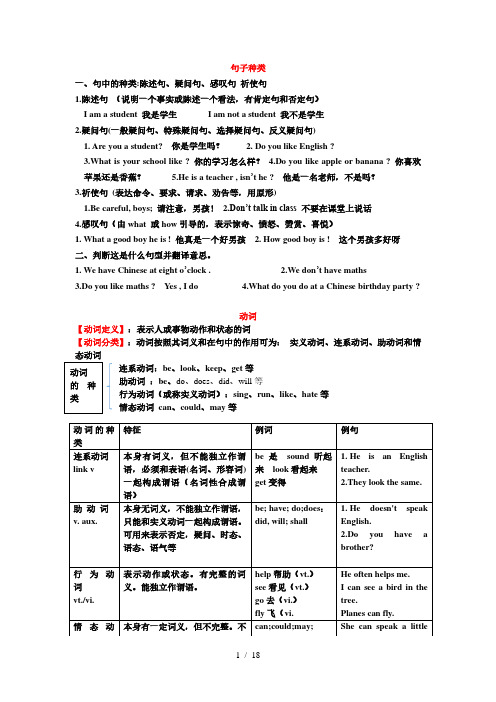
句子种类一、句中的种类:陈述句、疑问句、感叹句 祈使句1.陈述句 (说明一个事实或陈述一个看法,有肯定句和否定句) I am a student 我是学生 I am not a student 我不是学生2.疑问句(一般疑问句、特殊疑问句、选择疑问句、反义疑问句) 1. Are you a student? 你是学生吗? 2. Do you like English ?3.What is your school like ? 你的学习怎么样?4.Do you like apple or banana ? 你喜欢苹果还是香蕉?5.He is a teacher , isn ’t he ? 他是一名老师,不是吗? 3.祈使句 (表达命令、要求、请求、劝告等,用原形)1.Be careful, boys; 请注意,男孩!2.Don’t talk in class 不要在课堂上说话 4.感叹句(由what 或how 引导的,表示惊奇、愤怒、赞赏、喜悦)1. What a good boy he is ! 他真是一个好男孩2. How good boy is ! 这个男孩多好呀 二、判断这是什么句型并翻译意思。
1. We have Chinese at eight o ’clock .2.We don ’t have maths3.Do you like maths ? Y es , I do4.What do you do at a Chinese birthday party ?动词【动词定义】:表示人或事物动作和状态的词【动词分类】:动词按照其词义和在句中的作用可为: 实义动词、连系动词、助动词和情态动词连系动词:be 、look 、keep 、get 等 助动词 :be 、do 、does 、did 、will 等 行为动词(或称实义动词):sing 、run 、like 、hate 等 情态动词 can 、could 、may 等提问: 1.举出三个系动词,并说出它的特征。
现在完成时及现在完成进行时讲解及练习知识讲解

现在完成时及现在完成进行时讲解及练习现在完成时和现在完成进行时一.现在完成时的构成:助动词 have(has)+动词的过去分词构成。
has用于第三人称单数,have用于其他各种人称.二.现在完成时的用法:其用法主要有三种I.“已完成”用法 :表示一个过去发生并结束的动作对现在造成的影响或结果。
这一类情况可以细致分为下述两种情况。
1)表示开始于过去的动作刚刚结束。
常和just,just now连用。
Li Ming has just turned off the light. 李明刚刚把灯关上。
I've finished my homework just now. 我刚刚做完作业了。
2)表示过去动作的结果,现在仍残留着。
I have lost my pen. 我把笔丢了。
(说明过去某时丢的,现在我还没找到这支笔)She has become a teacher. 她已经当了老师。
(说明她现在仍是老师)II.“未完成”用法。
表示动作或状态从过去某时开始,持续到现在,可能继续下去,也可能刚刚结束。
常和段时间连用。
如lately,recently,these days,in the past few days,during the last two weeks,since,for +段时间,so far,up to now,till(until) now等。
He has lived here for 30 years. 他住在这儿三十年了。
(现在还住在这儿)They've known each other since childhood. 他们从小彼此相识。
(现在还在往来)How long have you studied English?你学英语多久了?(现在仍在学)III. 经验性用法:表示从过去开始到目前为止这段时间中反复发生的动作或多次出现的状态。
常与频度副词如,never,ever, already, yet,often,always,every week,twice等连用。
- 1、下载文档前请自行甄别文档内容的完整性,平台不提供额外的编辑、内容补充、找答案等附加服务。
- 2、"仅部分预览"的文档,不可在线预览部分如存在完整性等问题,可反馈申请退款(可完整预览的文档不适用该条件!)。
- 3、如文档侵犯您的权益,请联系客服反馈,我们会尽快为您处理(人工客服工作时间:9:00-18:30)。
Ⅰ. Choose the best answer (选择)1. The firemen can't go into the room because the door ________ by someone.A. locksB. was lockedC. has lockedD. locked2. When you phoned me yesterday afternoon, I ________ table tennis with my son.A. had playedB. playedC. was playingD. has played3. You don't have to go there yourself. I ________ my parents everything about it already.A. will tellB. toldC. had toldD. have told4. Lucy ________ ill for two days, so she cannot go to school today.A. has beenB.had beenC. will beD. is5. Little Tom ________ while everybody else was listening to the teacher carefully.A. had sleptB. will sleepC. sleptD. was sleeping6. Some of the Chinese celebrities(名人) ________ to attend the Oscar Award Ceremony. It was a big event early this year.A. have invitedB. were invitedC. will inviteD. are invited7. Sam usually ________ his key to his neighbor when he is away from home.A. leavesB. has leftC. will leaveD. is leaving8. By the end of last term, we ________ English for four years.A. have learnedB. learnedC. would learnD. had learned9. Tornadoes swept across the South America last month. At least 28 people ________.A. killedB. are killedC. were killedD. were killing10. My uncle will send me some local postcards and stamps after he ________ France.A. reachesB. reachedC. will reachD. is reachingⅡ. Choose the best answer.Buck did not read the newspapers. He did not know that ____1____ was coming for every big dog in California. Men had found gold in the Y ukon, and these men wanted big, strong dogs towork in the cold and snow of the north.Buck lived in Mr Miller's big house on the sunny farm. There were large gardens and fields of fruit trees around the house, and a river nearby. In a big place like this, ____2____,there were many dogs. There were house dogs and farm dogs, but they weren't important. Buck was the chief dog and this was ____3____ place. He was four years old and weighed sixty kilos. He went swimming with Mr. Miller's sons, and walking with his daughters. He carried the grandchildren on his back, and he sat at Mr. Miller's feet in front of the fire in winter.But this was 1897, and Buck did not know that men and dogs were hurrying to north-west Canada to look for gold. And he did not know that Manuel, one of Mr. Miller's gardeners, needed money for his large family. One day, when Mr. Miller was out, Manuel and Buck left the garden together. It was just an evening walk, Buck ____4____. No one saw them go, and only one man saw them arrive at the railway station. This man talked to Manuel, and gave him some money. Then he tied a piece of rope around Buck's neck.Buck ____5____, and was surprised when the rope was pulled hard around his neck. He jumped at the man. The man caught him and suddenly Buck was on his back with his tongue out of his mouth. For a few moments he was unable to move, and it was ____6____ for the two men to put him into the train.1.A. money B. trouble C. gold D. Snow2.A. for example B. in fact C. above all D. of course3.A. her B. their C. his D. its4.A. said B. thought C. heard D. wondered5.A. cried B. laughed C. smiled D. died6.A. impossible B. difficult C. easy D. necessaryⅠ. Read the passage and fill in the blanks with the proper words (在短文的空格内填入适当的词,使其内容通顺,每空格限填一词,首字母已给)(1)Anger(生气) is a kind of feeling. Many things can make you angry. When your teacher givesyou too much homework, when your team loses an important game, when your friend b____1____ your favorite thing and then breaks it, you may get really angry.Usually, your body will tell you when you are angry. For example, you breathe much f____2____, your face turns red, and you may want to break something or hit someone, but sometimes, you hide your anger. For example, you may hide it in your h____3____. The problem is that if you do this, you may get a headache or your stomach may hurt.In fact, it's not good to hide your anger, and it's normal for you to get angry sometimes. But anger must be let out in the right way, without hurting d____4____ or yourself. Let me give you some advice.When you get angry, you can talk about it with other people. It's helpful to talk about your anger with other people, such as p____5____ teachers, good friends etc. When you talk about anger, those b____6____ feelings can start to go away. On the other hand, when you start to feel angry, you can do some other things: count from 1 to 100; go for a bike ride; think about good things, etc.Don't let your anger c____7____ you. Remember that how you act when you are anger can make everything better or worse.(2)At some time in your life, you might have a roommate. It is a good idea to share a flat, especially for students or people who have just finished school, because flats are usually expensive. And m____1____is not the only reason for having a roommate. Sharing a flat can be fun.But life with a roommate can also be a t____2____experience. Some experts(专家) did a study of college students who shared a room. They found that students who had problems with their roommates were not happy at school and were more likely to get sick than other students. So, how can you l____3____with a roommate and enjoy it? Here is some advice:Being roommates with a friend can be hard. Friends may be different when you stay with them all the time from when you don't see them very o____4____. So, before you plan to share a room with a friend, discuss the situation carefully.If you decide to share a room with someone you don't know, talk to each other. It's important to be h____5____about your habits and things you hate.When you move in with a roommate, make rules. Decide how you will share h____6____, such as cleaning, washing and shopping. Will you share food? Is it OK to have guests? And what about loud music?Don't get angry at small things that your roommate does. Try to f____7____the unhappy things between you and your roommate. No one - including you- is perfect.(3)When Jake Herbet went into his bathroom, he got a very big surprise. He found a snake, which measures 183 cm, curled up in the shower.When Jack saw it, he immediately c ____1____ the snake-catcher, Chris Kent, to rescue the reptile (爬行动物). 'It is probably an escaped pet,' he said. 'Last month four snakes escaped from their owners' houses in this part of Australia. When I saw it, I was r____2____ shocked. I've seen frogs and big spiders but n____3____ a python (蛇) as big as this. This snake isn't poisonous but it is big. Snakes like this need a lot of food and a rescue tank to keep them in. Most people just don't have enough space.'The only way the snake could get into the bathroom was t____4____ the water pipes and then into the toilet. The bathroom had no windows and the door was closed. Nobody knows how long the snake was in the pipes but it was very hungry. First of all, Chris Kent gave the snake a good wash and somefood. Then he took it to the vet for a m____5____ check. It was finally taken to Sydney Zoo, w____6____ it lives today. Surprisingly, the snake was perfectly healthy with no sign of any injury. Chris Kent said, 'Snakes really scare some people. In the past people have attacked a snake in panic (惊慌失措地). We are very thankful that Mr Herbert remained calm and didn't panic. Everyone had a lucky e____7____ .Ⅰ. 1-5 BCDAD 6-10 BADCAⅡ. 1-6 BDCBACⅠ. (1) borrows faster heart others parents bad control(2)money terrible live often honest housework forget(3)called really never through medical where escape。
